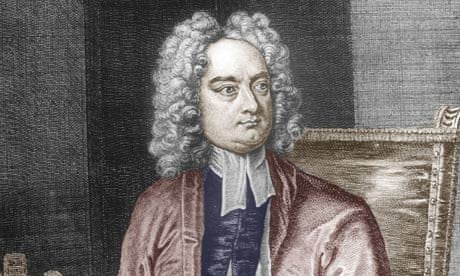Perhaps the Daily Mail should take a leaf out of Jonathan Swift's book and instead of blaming changes in English on "a tidal wave of mindless Americanisms", start calling those damned poets to book. I am immensely grateful to the British library for bringing my attention to Swift's wonderful early 18th-century Proposal for Correcting, Improving and Ascertaining the English Tongue – part of a new British Library exhibition detailing the history of the English language – in which he lays into versifiers for the travesties they have committed in the name of poetry.
"These Gentlemen, although they could not be insensible how much our Language was already overstocked with Monosyllables; yet, to save Time and Pains, introduced that barbarous Custom of abbreviating Words, to fit them to the Measure of their Verses; and this they have frequently done, so very injudiciously, as to form such harsh unharmonious Sounds, that none but a Northern Ear could endure", writes Swift. Well, indeed. "They have joined the most obdurate Consonants without one intervening Vowel, only to shorten a Syllable … What does Your Lordship think of the Words, Drudg'd, Disturb'd, Rebuk't, Fledg'd, and a thousand others, every where to be met in Prose as well as Verse? Where, by leaving out a Vowel to save a Syllable, we form so jarring a Sound, and so difficult to utter, that I have often wondred how it could ever obtain."
Because it turns out, you see, that we Brits have been lamenting declining standards of English for centuries: all the way back in 1712 Swift wanted to "fix our Language for ever" to stop any more change. The British Library exhibition will also highlight a 19th-century pamphlet, which attempted to persuade the lower-middle classes to stop dropping their "h"s if they wanted to get ahead, and it makes the point that far from being a curse of today, text speak was actually prevalent around 150 years ago, as shown by its exhibit of Charles C Bombaugh's poem Essay to Miss Catharine Jay. Just take a look: apparently the poem was much admired, but it looks like the sort of thing one of today's teenagers could dash off in a minute: "an S A now I mean to write / To U, sweet KTJ"; "I 1 der if you got that 1 / I wrote 2 U B 4", etc. (Although I'm quite impressed by the line "in X L N C U X L" ... can anyone beat that?)
I am the sort of grumpy person who refuses to abbreviate anything in my texts, relishing the amount of time it takes me to type out the full words, who orders a medium coffee in Starbucks (not a venti or grande or whatever they call it – and incidentally, pity this poor woman who refused to kowtow to the company's ridiculous vernacular and was ejected by police), who is annoyed by the fact that "staycation" has now been entered in the Oxford English dictionary and enraged that Enid Blyton's getting a 21st-century makeover.
So I'm feeling a little silly to realise that, actually, this is nothing new. We've been whining on about the deterioration in English for years and years and years, and perhaps we need to get over ourselves. Looking at Swift's 300-year-old plea to keep things the same I'm minded to think that, actually, part of the glory of English, from Shakespeare's insults to Bombaugh's txt speak to the ever-expanding dictionaries of today, is its constantly changing nature, its adaptability, its responsiveness.
It does make me wonder, though, about where English will be 300 years from now: as a science fiction reader I always love seeing how authors tackle this issue (one of the best examples is Gene Wolfe's The Book of the New Sun, set a million years in the future, where he explains in a "note on translation" how he went about "rendering this book – originally composed in a tongue that has not yet achieved existence – into English". It's great).
So I'm sorry, Mr Swift, but I say let those dastardly poets (and teenagers, and Americans) do their worst: I'll undoubtedly continue to be grumpy about the brutal way English can be used, but I don't ever want it to be fixed in stone. Complaining about particularly egregious examples of misuse/new word-coinings is always fun, though: let's see if you've got some good enough to persuade me otherwise.

